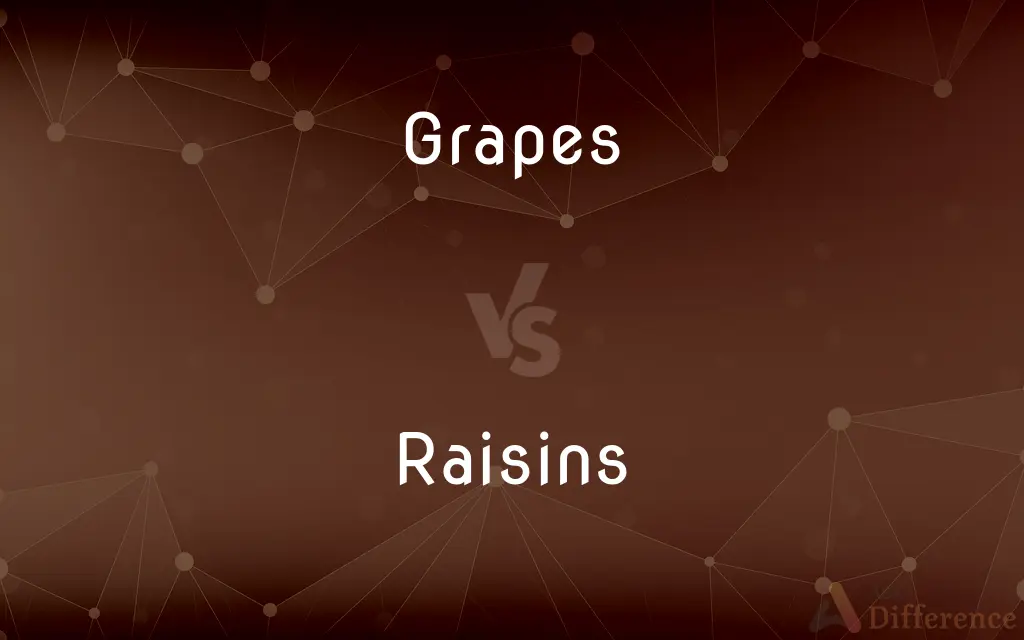Grapes vs. Raisins — What's the Difference?
By Tayyaba Rehman — Published on December 2, 2023
Grapes are fresh, juicy fruits, while raisins are dried grapes with concentrated sweetness.

Difference Between Grapes and Raisins
Table of Contents
ADVERTISEMENT
Key Differences
Grapes are small, round, and juicy fruits that grow on vines and come in various colors such as green, red, and purple. They are often eaten fresh, used in making wines, or processed into other products. Raisins, on the other hand, are grapes that have undergone a drying process, which reduces their water content and increases their sugar concentration.
While grapes are known for their refreshing taste and high water content, raisins are chewy, shriveled, and have a concentrated sweetness due to the drying process. Both grapes and raisins offer a range of health benefits, but their nutritional profiles differ slightly because of the transformation from grapes to raisins.
Grapes can be enjoyed in a variety of culinary applications, from being part of salads to being the primary ingredient in wines. Raisins are versatile too; they can be added to baked goods, cereals, or consumed as a sweet snack. The transition from grapes to raisins involves exposure to sunlight or artificial drying techniques, which leads to the evaporation of water from the grapes.
The texture and moisture content are stark distinguishing factors. Grapes are plump and juicy, providing immediate hydration, while raisins have lost most of their water, resulting in a dense and sweet treat. Both grapes and raisins have been integral to culinary traditions across cultures, appreciated for their unique flavors and health benefits.
Comparison Chart
State
Fresh fruit.
Dried fruit.
ADVERTISEMENT
Water Content
High water content.
Reduced water content.
Texture
Juicy and plump.
Chewy and shriveled.
Sugar Concentration
Natural sugar levels.
Concentrated sugars due to drying.
Use in Cooking
Salads, wines, juices.
Baked goods, cereals, snacks.
Compare with Definitions
Grapes
Juicy orbs used in winemaking.
The winemaker selected the finest grapes for his vintage.
Raisins
Chewy snacks resulting from dried grapes.
Raisins are a popular addition to many baked goods.
Grapes
Source of many vitamins and antioxidants.
Eating grapes can provide numerous health benefits.
Raisins
Dried grapes with concentrated sweetness.
She sprinkled raisins on her oatmeal for added flavor.
Grapes
Consumed fresh or processed into products.
The factory processed the grapes into delicious juice.
Raisins
Sweet treats with reduced moisture.
Raisins are often used in cereals and cookies.
Grapes
Fresh fruits growing on vines.
The vineyard was full of ripe grapes ready for harvesting.
Raisins
Nutritious dried fruits rich in energy.
Athletes often consume raisins as a quick energy source.
Grapes
Fruits with varied colors and types.
She preferred red grapes over the green ones.
Raisins
Result of grapes' exposure to sunlight or artificial drying.
The grapes were laid out in the sun to turn into raisins.
Grapes
Any of various woody vines of the genus Vitis, bearing clusters of edible berries and widely cultivated in many species and varieties.
Raisins
A sweet grape dried either in the sun or by artificial means.
Grapes
The fleshy, smooth-skinned, purple, red, or green berry of a grape, eaten raw or dried as a raisin and widely used in winemaking.
Raisins
A deep brownish purple.
Grapes
A dark violet to dark grayish purple.
Raisins
Plural of raisin
Grapes
Grapeshot.
Grapes
Plural of grape
Common Curiosities
Why are raisins sweeter than grapes?
Raisins have concentrated sugars because the drying process reduces their water content.
How do raisins differ from grapes?
Raisins are dried grapes with a concentrated sweetness and chewy texture.
What are grapes?
Grapes are fresh, juicy fruits that grow on vines and can be consumed raw or processed.
Are the health benefits of grapes and raisins the same?
Both offer health benefits, but their nutritional profiles differ slightly due to the drying process.
Why do raisins look shriveled?
The shriveled appearance results from the loss of water during the drying process.
Can all grapes be turned into raisins?
Technically, yes, but some grape varieties are preferred for making raisins due to their sweetness and size.
Why are some grapes used for winemaking while others are eaten fresh?
Different grape varieties have characteristics suited for winemaking or fresh consumption.
Can raisins be rehydrated?
Yes, soaking raisins in water or juice can rehydrate them.
How are raisins typically stored?
Raisins are best stored in a cool, dry place in an airtight container.
Are grapes and raisins safe for pets?
No, grapes and raisins can be toxic to many pets, especially dogs.
Are grapes and raisins calorie-dense?
Grapes have fewer calories due to their water content, while raisins are more calorie-dense due to concentrated sugars.
Can grapes be frozen for later use?
Yes, grapes can be frozen and enjoyed as a cold snack or used in recipes.
Do grapes have seeds?
Grapes can be seedless or have seeds, depending on the variety.
Are there different types of raisins?
Yes, raisins can differ based on the type of grape used and the drying method applied.
How are raisins produced?
Raisins are produced by drying grapes either under the sun or through artificial methods.
Share Your Discovery

Previous Comparison
American Rottweilers vs. German Rottweilers
Next Comparison
Tyndall Effect vs. Brownian MotionAuthor Spotlight
Written by
Tayyaba RehmanTayyaba Rehman is a distinguished writer, currently serving as a primary contributor to askdifference.com. As a researcher in semantics and etymology, Tayyaba's passion for the complexity of languages and their distinctions has found a perfect home on the platform. Tayyaba delves into the intricacies of language, distinguishing between commonly confused words and phrases, thereby providing clarity for readers worldwide.














































